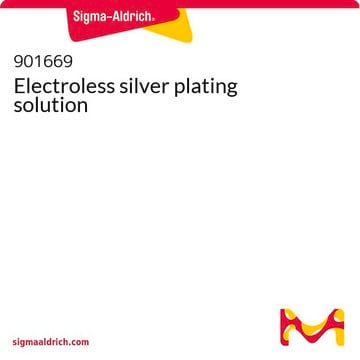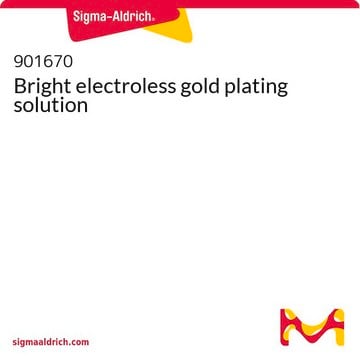901655
Electroless nickel plating solution
ammonia free
Synonym(s):
Nickelex
About This Item
Recommended Products
form
liquid
color
blue to green
pH
4.8-5.2
Looking for similar products? Visit Product Comparison Guide
Related Categories
General description
Advantages
- Stable, ready to use
- Plates without generating ammonia fumes
- Produces quality electrical contacts on p- and n-type silicon
- Does not compensate for p- or n- type conductivity
- Excellent adhesion and solderability
- Plates on silicon, germanium, gallium arsenide, cadmium sulfide
The chemical reaction during the electroless plating process involves an oxidation-reduction reaction between nickelous and hypophosphite ions. The reaction is essentially a two step process occurring simultaneously.
(1) H2PO2- + H2O --> H2OPO3- + H2
(2) Ni ++ (complex) + H2 --> Ni + 2H+
The reaction progresses catalytically with nickel deposition occurring at the operating temperature of 95 °C - 100 °C. The nascent hydrogen evolved insures an oxide free nickel deposit. In addition some NiP formed in a side reaction improves corrosion resistance and solderability. The nickel deposit is highly conductive, remains unstressed, particularly after suitable heat treatment, and shows good adherence.
Application
- Nickelex provides good mechanical and electrical contacts for semicodonductor devices (silicon rectifers, solar cells, varactors, microwave diodes, transistors, microcircuits, etc.). The quality of the electrical contact is excellent if the surface of silicon is abraded by lapping to increase surface recombination velocity; if the surface is highly doped from diffusion; or if the semicondcutor resistivity is low (0.1 ohm-cm). Nickelex also produces adherent deposits on germanium, gallium arsenide, and cadmium sulfide.
- The Nickelex plate exhibits excellent solderability with lead, tin, and Pb/Sn alloys. Flux can be omitted when furnaced soldered in a hydrogen or non-oxidizing atmosphere.
Instructions
Complete metallization procedures are provided for silicon rectifier and planar device fabrication. These procedures should be followed to obtain optimum adhesion of nickel and quality of the ohmic contacts.
Signal Word
Danger
Hazard Statements
Precautionary Statements
Hazard Classifications
Acute Tox. 3 Dermal - Acute Tox. 3 Oral - Acute Tox. 4 Inhalation - Aquatic Acute 1 - Aquatic Chronic 1 - Carc. 1A Inhalation - Eye Irrit. 2 - Muta. 2 - Repr. 1B - Resp. Sens. 1 - Skin Irrit. 2 - Skin Sens. 1 - STOT RE 1
Target Organs
Lungs
Storage Class Code
6.1C - Combustible acute toxic Cat.3 / toxic compounds or compounds which causing chronic effects
WGK
WGK 3
Flash Point(F)
Not applicable
Flash Point(C)
Not applicable
Certificates of Analysis (COA)
Search for Certificates of Analysis (COA) by entering the products Lot/Batch Number. Lot and Batch Numbers can be found on a product’s label following the words ‘Lot’ or ‘Batch’.
Already Own This Product?
Find documentation for the products that you have recently purchased in the Document Library.
Customers Also Viewed
Our team of scientists has experience in all areas of research including Life Science, Material Science, Chemical Synthesis, Chromatography, Analytical and many others.
Contact Technical Service












